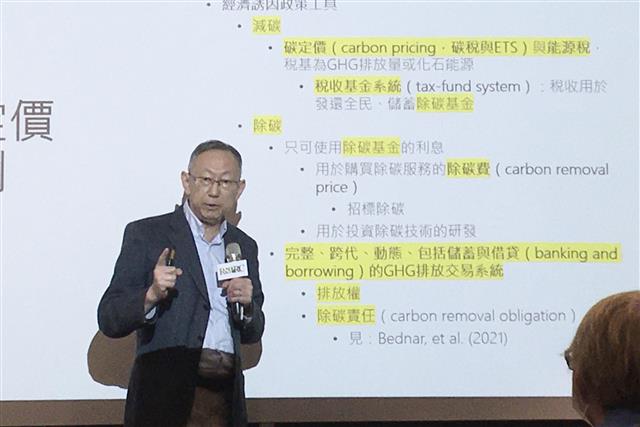Taiwan's electrical and electronics firms have perceived the pressure of having to tackle future carbon taxes across borders, an industry representative has said, urging the government to unveil a carbon pricing scheme soon to allow for early action.
Taiwan's National Development Council on March 30 unveiled a roadmap to achieve a carbon neutral society by 2050, after president Tsai Ing-wen last year endorsed the goal.
According to the roadmap, all new scooters and passenger cars should be electric by 2040. Big electricity users should source 30% of their power from green energy sources by 2050.
Taiwan's electricity demand is projected to grow at an annual average rate of 2±0.5% by 2050. The government envisions that the nation's energy mix by 2050 will be: 60-70% renewable energy, 9-12% hydrogen power, 20-27% fossil fuel power with carbon capture, utilization, and storage (CCUS) technology, the roadmap shows.
As of 2021, Taiwan generated 42.5% of electricity from gas-fired units, 35.5% from coal-fired units, 10.8% from nuclear power, 6.3% from renewable sources, and the rest from mixed sources, according to figures from the state-run Taiwan Power (Taipower).
While the government's willingness to launch the roadmap is appreciated, its roadmap has failed to address many issues, experts said during a forum hosted by National Taiwan University's Risk Society and Policy Research Center on April 1.
The 2±0.5% projection might be too conservative, as the Bureau of Energy's data show Taiwan's electricity consumption during the first 10 months of 2021 grew 4.3% year-on-year, said Frank Lin, senior advisor to Taiwan Electrical and Electronic Manufacturers' Association (TEEMA).
Many local ICT suppliers have established production bases in China, Taiwan, Southeast Asia, India, Mexico, and four countries in central Europe, Lin said.
TEEMA members have perceived the immense pressure of having to cope with caron taxes and other formidable challenges heralded by the global transition toward carbon neutrality, he said.
In 2021, Taiwan's ICT sector contributed 58% of the nation's total industrial revenues, and their export revenues made up 60% of the total, he said.
ICT firms: The big power users
There are 854 so-called big power users, of which 40% (334 firms) are ICT suppliers. Meanwhile, 113 ICT firms are listed among 287 big carbon emissions producers, he said.
ICT component productions feature diversified supply chains across several countries, from Taiwan to the US, or from bases in China and India to other countries, Lin added.
How carbon border taxes will be calculated will impact the competitiveness and survival of TEEMA members, he said.
Lin also expressed concern whether there will be sufficient baseload power supply if Taiwan is to have 60% renewable energy by 2050.
On March 30, a solar power storage system in Taichung caught fire, and the system used NMC batteries, exposing the safety problems of such systems, Lin said.

Academia Sinica's Institute of Economics adjunct research fellow Daigee Shaw speaks at an event in Taipei.
Photo: Ines Lin, DIGITIMES, April 2022
It is regrettable that the Ministry of Finance was not engaged when the cabinet announced the roadmap and related plans, said Daigee Shaw, an adjunct research fellow at Academia Sinica's Institute of Economics.
The UK government knows better about how to leverage financial tools to encourage climate action, he said.
Taiwan's government ought to levy carbon tax and set up a tax fund, Shaw said, adding that the planned carbon fee to be charged by the Environmental Protection Administration would not be effective enough to curb carbon emissions.
Taiwan's public transportation is not yet fully utilized, said Jason Chang, senior advisor to Taiwan Telematics Industry Association.
The Ministry of Transportation and Communications must play more active roles, said Chang, also a professor of civil engineering at National Taiwan University.
Among 14.5 million people who commute for work in northern Taiwan, only 33% take public transport, such as MRT, and the figure drops to 15% when it comes to the entire nation, he said.
The central government should further engage local governments to promote shared vehicles, such as bicycles and scooters, as well as electric vehicles (EVs), he said.
"Automatic, connected, electrified, shared" are four major trends of vehicle developments, Chang said, citing e-scooter supplier Gogoro's listing on Nasdaq as an inspiring example.




